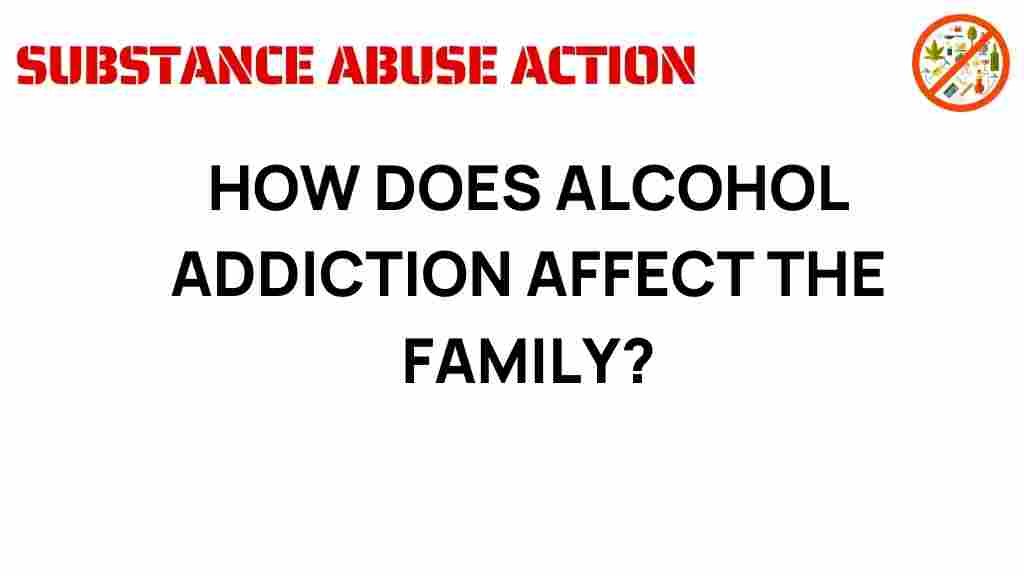The Hidden Impact of Alcohol Addiction on Families
Alcohol addiction is not just a personal battle; it deeply affects family dynamics, creating a ripple effect that impacts every member of the family. Understanding the emotional toll that alcohol addiction takes on families is crucial for both individuals struggling with addiction and their loved ones. This article aims to explore the various dimensions of alcohol addiction, focusing on relational strain, communication barriers, coping strategies, support systems, and the recovery journey.
Understanding Alcohol Addiction
Alcohol addiction, often referred to as alcoholism, is a chronic disease characterized by an inability to control or stop drinking despite the negative consequences it brings. This addiction does not just impact the individual; it alters the fabric of family life.
Family Dynamics Affected by Alcohol Addiction
Families are often the first line of support for individuals dealing with alcohol addiction. However, the presence of alcohol addiction can significantly disrupt family dynamics. Here are some of the ways in which these dynamics are affected:
- Relational Strain: Alcohol addiction can lead to increased tension and conflict within the family. Relationships often become strained as family members struggle to cope with the addiction.
- Communication Barriers: Open and honest communication becomes challenging when addiction is involved. Family members may feel afraid to express their feelings or concerns, leading to misunderstandings.
- Emotional Toll: The emotional burden on family members can be immense. Feelings of anger, sadness, and helplessness are common as loved ones witness the destructive effects of alcohol addiction.
The Emotional Toll on Families
The emotional toll of alcohol addiction on families can manifest in various ways:
- Anxiety and Depression: Family members may experience anxiety or depression due to the unpredictability of a loved one’s behavior and the ongoing stress of dealing with addiction.
- Guilt and Shame: Often, loved ones feel guilty for not being able to help or shame for their family member’s addiction, which can lead to isolation.
- Fear: Fear of what might happen to the addicted family member, or the potential for violence or instability in the home, can create a constant state of worry.
The Recovery Journey
The recovery journey from alcohol addiction is a complex process that not only involves the individual but also requires the support and involvement of family members. Understanding this journey can help families navigate the challenges they face:
- Seeking Help: The first step in recovery is acknowledging that there is a problem. Families should encourage their loved ones to seek help, whether through therapy, support groups, or rehabilitation programs.
- Setting Boundaries: It is essential for family members to set healthy boundaries during the recovery process. This helps protect their emotional well-being while also supporting their loved one’s journey.
- Participating in Family Therapy: Engaging in family therapy can help address the relational strain caused by alcohol addiction. It provides a safe space for open communication and healing.
Support Systems for Families
Developing strong support systems is vital for families dealing with alcohol addiction. Here are some options:
- Support Groups: Organizations like Al-Anon offer support for family members of those struggling with alcohol addiction. These groups provide a platform to share experiences and coping strategies.
- Professional Counseling: Seeking professional help can provide families with tools to cope with the emotional toll of addiction. Counselors can offer guidance on communication and effective coping techniques.
- Community Resources: Many communities offer resources such as workshops and seminars focused on addiction recovery. These can be invaluable for families seeking to understand addiction better.
Coping Strategies for Families
Families must develop effective coping strategies to manage the stress and challenges that come with alcohol addiction. Here are some strategies that can help:
- Practice Self-Care: Family members should prioritize their well-being. Engaging in activities that promote mental and physical health is crucial during this time.
- Open Communication: Creating an environment where family members feel safe to express their feelings can help alleviate some of the relational strain caused by alcohol addiction.
- Educate Yourself: Learning about alcohol addiction can help family members understand what their loved one is going through, fostering empathy and reducing feelings of isolation.
Troubleshooting Tips for Families in Crisis
In moments of crisis, families may feel overwhelmed. Here are some troubleshooting tips to help navigate challenging situations:
- Stay Calm: In times of crisis, it is essential to remain as calm as possible. This can help de-escalate tense situations.
- Seek Immediate Help: If a loved one is in immediate danger due to their alcohol use, seeking professional help or contacting emergency services is crucial.
- Develop a Safety Plan: Create a plan for what to do in crisis situations, including who to call for help and how to ensure safety for all family members.
Conclusion
Alcohol addiction is a complex issue that has profound effects on family dynamics. The emotional toll can be significant, influencing relationships, communication, and overall family health. However, understanding these impacts is the first step towards healing.
Families play a critical role in the recovery journey of their loved ones. By developing support systems, practicing effective coping strategies, and engaging in open communication, families can foster an environment conducive to recovery.
While the challenges are immense, the journey towards recovery can also bring families closer together, helping them to rebuild trust and strengthen their bonds. If you or someone you know is struggling with alcohol addiction, consider reaching out to local resources or support groups for assistance. For more information, you can visit this helpful resource.
Ultimately, understanding the hidden impact of alcohol addiction on families is crucial in navigating the complexities of this journey. By prioritizing emotional health and fostering supportive environments, families can emerge stronger on the other side of addiction.
This article is in the category Addiction and created by SubstanceAbuseAction Team
